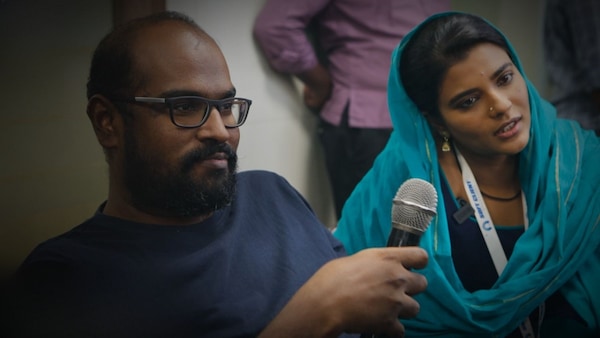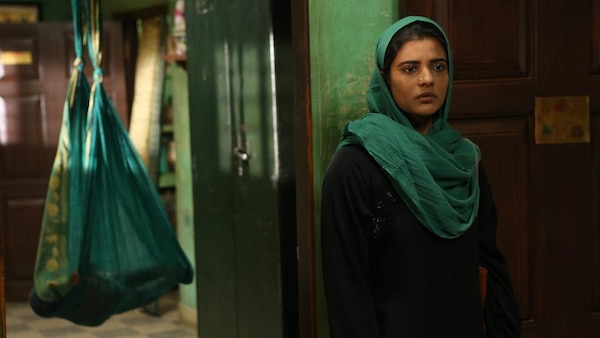The Nelson Venkatesan Interview | 'I Love The Process Of Filmmaking, Storytelling'
Having won praise for his deft helming of Aishwarya Rajesh-starrer Farhana, director Nelson Venkatesan chats with Subha J Rao about his cinematic influences and concerns.

Last Updated: 06.15 PM, Jun 18, 2023
Farhana, Nelson Venkatesan’s third film (after realistic set of stories Oru Naal Koothu, and the human interest drama Monster that featured a rat), has been receiving appreciation for its portrayal of a young Muslim woman in Chennai and how she deals with what life throws at her after she joins a call centre (first, for a bank and later for a friendship chat line) to add to the family’s income.
The film stands apart because it does not judge any of its characters at any stage of their arc. Some swing between white and grey, and you understand, even empathise. In a deeply intolerant world, Nelson’s creation is an empathetic take on a family trying to rise above its circumstances. Much like his previous work, this film too is not intrusive — the camera lingers in the background as Farhana goes about her life. No one is forced to explain themselves, and Nelson also manages to write one of the more beautiful onscreen declarations of love between a couple that has never had a time for conversation. Edited excerpts from an interview:
Everyone is speaking about the sensitivity with which you wrote the film. Where does that come from?
By nature I am sensitive and emotional. And, secondly, I’ve grown up around people from the Muslim faith — all were my annas and akkas — and so I do not have any preconceived notions about them. I’ve been deeply appreciative of their love and affection and their humility.
I grew up in Royapettah, and things are fine in my world. So, there was little reason to be insensitive. Yes, I possibly also wanted to take a stand on the prevailing Islamophobia. What happens to children if this continues, if they are constantly questioned on the basis of their religion? And so, when I was writing, I was extra careful to not allow any prejudice to step in. We had exhaustive discussions during the pre-production stage and I ran the script past people, including many women and my school friends, so that we can remove anything that is hurtful.
We had Muslims in the production team and I shared the script with my friends from the faith, so that nothing would ever hurt anyone’s sentiments. That said, there were doubts and some people raised objections, but once they saw what the film was about, they stepped back. And producer SR Prabu backed us, ensuring we got this kind of pull.

How did you write Farhana to be this person who’s innocent, but who also gets charmed by a voice and who flirts with danger?
I was clear during the writing process that this is a girl who’s constantly worked without any appreciation and when she falls, it is for a tender voice over the phone who ‘sees’ her for what she is. He treats her well, gently, as a human and not just another woman on the phone. He makes no lustful demands.
At the same time, I never wanted to villanise the husband. He’s a very nice person too. He loves her, but they are bound by the constraints of a joint family. He even feels guilty following her, but he just knows she’s in trouble and wants to be there for her. He knows she’s the smarter of the two. He trusts her. He knows that all he knows is to help customers with their new slippers at the store.
As for Farhana, she’s a little fish who enters the big ocean. She has no idea what journey she’s on and has to fight her own battle. I wanted that metre to be correct — that she will be her own saviour. That she will make smart choices after a point in time.
What was it like to work with Aishwarya, who literally lived as Farhana?
It was quite the experience. We took some time to sync, but after that it was a breeze. Aishwarya fit in beautifully in the milieu of the movie. We shot on location and there was congestion, noise, stench and more, but she was very comfortable mingling with people and being one of them. She went through the process of a workshop, practised her namaz, and stayed in metre throughout.
How did you ensure this for all the performers, this staying in metre?
I love the process of filmmaking and I love the process of storytelling. If anyone has any doubts, I would gladly explain it all over again to them. I think this will result in a better shot. All that sweat, all that heat, and when the artistes live that character, you get something special. The challenge is the process — the ride might be bumpy but the landing is smooth.
In eight years, you’ve made three films, and your team has been near-constant…
My team (composer Justin Prabhakaran, cinematographer Gokul Benoy and editor Sabu Joseph who have been with him since ONK) is like my family. We have spent time beyond films. Our taste in cinema, and the kind of people we are give us the space to work on what we visualise. We need a certain synergy to pull off a film, and my team, including the poster designer (Siva Kumar), are on the same page.
For Farhana, art designer Shiva Shankar ensured we walked into a house, not a set. That realism transfers to the scene. For instance, we did 20 revisions for the sound design (Prathap) for Farhana, because I wanted it to sound like the Ice House area in Triplicane.
We are hungry to do something new for every film. I’m now working on on writing an action drama. And this bond was formed a long time ago. It helps that we don’t work together every day — we have our boundaries too.
Women are an important part of your films — Oru Naal Koothu, Monster and now Farhana. How do you write your women? Who are the women you grew up around?
I was raised by a single mother and studied in Sri Venkateshwarar Matriculation Higher Secondary School in Royapettah, Chennai. My first exposure to girls/women other than my mother were my classmates. The five or six of them taught me a lot about love and care and values and what makes a man good. Without my knowledge, and without actively working on it, I grew up with a healthy set of friends during my adolescence.
Next were my teachers. I came from a family that struggled financially and my teachers took tremendous care of me. I remember my History and Geography teacher Lalitha Miss, who was another parent for me. My Maths teacher Dhanalakshmi Miss was another. They taught me how women could carry themselves with dignity, care and authority. I studied well so I would never let them down.
While mingling with them, I also saw up close the disparity between men and women. I realised that when men did something, there would be a justification that women did not receive.
I’d give huge credit to the women in my life — my mother, my ex-girlfriend, my ex-wife and friends — for making me understand the position of women.
You spent a lot of time with your mother…
Amma (Celin Venkatesan) would have been 70 had she been alive. She’s the most enterprising woman I know. After Appa died and she had to raise me, she would go to work in these travelling exhibitions. She’d take me and we would spend 10 days in a new city — we would go to 8-10 cities a year. I’d be amazed at how she had the courage to go to a new city, sell things, handle finances and conquer life. The one thing she did not do was take care of herself. But I’m happy she lived long enough to see the love Monster received.
Subscribe to our newsletter for top content, delivered fast.
